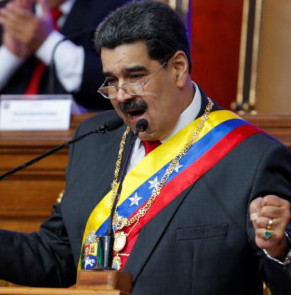The forced landing of the Irish Ryanair company's plane in Minsk and the subsequent arrest of the Belarusian opposition telegram channel Nexta creator Roman Protasevich have caused an abrupt response with the West. They do not believe that there was a bomb planted in the plane and intend to ban flights over Belarus and impose new sanctions against it. At the same time, London also discovered "Moscow's hand" in this incident, urging to punish Russia alongside.
Just a reminder: the Athens to Vilnius Ryanair flight was forced to land in Minsk on May 23. The Belarusian authorities claim that bomb threat statements came from the Palestinian Hamas group. Protasevich was detained in the course of plane inspection for explosive devices; he is giving evidence at the Belarusian KGB. He may up to 15 years in prison, with a case opened against him pursuant to several articles, including the "Organization of civil unrest".
The Ryanair aircraft incident recalibrated the work of the unplanned EU summit held in Brussels on May 24-25 to become the first physical meeting for quite some time. Leaders of the 27 EU countries actually spent the entire first day discussing ways to punish Belarus for this plane landing and Protasevich's arrest. By the way, someone urged to punish Russia as well. It was not a EU member, but Britain that left it last year. Thus, London will consider sanctions against Nord Stream 2, British Foreign Minister Dominic Raab said yesterday. The British Parliament also called for sanctions against the Yamal-Europe gas pipeline.
In this regard, it is necessary to quote Press Secretary of the Russia President Dmitry Peskov, who deems London-made statements that the Belarusian authorities' actions with respect to the Ryanair plane were hardly possible without Kremlin's awareness, a manifestation of "Russophobic obsession". "It is Russophobic obsession, a fixed idea Russia is responsible for everything. Possibly very soon we will hear Russia is to blame for its mere existence. Unfortunately, such accusations, inappropriate from the political point of view, do take place," he said at a briefing on May 25.
However, it is fair to say that European Union leaders are not inclined to share London's opinion as regards punishing Russia. They did not review relations with Moscow. Moreover, the current summit did not see any strategic dialogue on the issue, as the Belarusian incident took a lion's share of EU leaders' time. Admittedly, the long-awaited discussion did not promise well: seeking to maintain at least some kind of constructive narrative, European countries could hardly offer a convincing alternative to the current principles in their relations with Russia.
It is no coincidence that the speech by head of the European Commission (EC) Ursula von der Leyen at the press conference following the first summit day was quite neutral and restrained. According to her, the European Union and Russia are closely linked and remain neighbors and essential trading partners, despite all their problems. "Russia is our biggest neighbor, Russia and the EU are closely linked, they remain neighbors and important trade partners. Russia is an important player in solving global challenges. That is why we asked Foreign Minister Josep Borrel to submit a report on Russia, and we will look at relations with it in the light of that report," the EC head said.
It should be noted here that the report by the European Union's chief diplomat is due in June to be published following the meeting between US and Russian Presidents Joe Biden and Vladimir Putin on June 16. And this does not seem accidental, since Brussels is uncomfortable about spoiling relations with Washington: the EU intends to wait for a further development of Russian-American relations before structuring relations with Moscow.
In the meantime, the European Union will adhere to the previous Russia policy, namely to playing well with Moscow. At least, there are no extra sanctions being prepared against our country. All the more so as some members of the union oppose this line, in particular Germany and Luxembourg.
At the same time, we can hardly expect any thaw in EU relations with Russia. Having confirmed their commitment to the so-called "five principles" at the recent summit, Mrs. von der Leyen accused Moscow of constant long-term attempts to challenge the values and interests of the European Union through "cyber attacks, sabotage and spreading misinformation", as well as of "interference and destabilization" in Ukraine, Moldova and Georgia.
Earlier this month, the European Parliament's International Affairs Committee prepared draft recommendations on forming a long-term EU strategy in terms of its relations with Russia. It contains five principles related to both countering the Russian authorities' policy and supporting Russia's civil society. The first of them is containing the Russian threat. The European Union, along with NATO and other partners, should counteract Russia's "aggressive policy" and put the screws on it to help the eastern neighbors of the European Union recover their territories. The second principle concerns the fight against Russian influence and hybrid threats. The third and fourth principles imply actions in defense of democracy that should be coordinated with the United States. Finally, the fifth principle is support for democracy in Russia's neighboring countries. It implies strengthened cooperation with the Eastern Partnership countries to serve as a good example that would encourage the people of Russia to support democracy.
As we can see, these principles do not allude to improving the European Union's relations with Russia. However, let's wait till the Russia-US summit. Perhaps, the meeting of Presidents Putin and Biden will yield some changes in the European Union's stance towards Russia.









